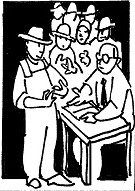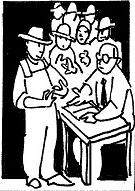

“Am I not free to do as I wish?” (Matthew 20:16).
Ezek 34:1-11; Matt 20:1-16
Because the provocative parable of the Vineyard Workers is unique to Matthew, it is worth asking what issues it may have been addressing in his faith community. It seems crafted to infuriate anyone who identifies with the early birds who work a 12-hour day for the same wage as the latecomers who only work one hour. As an image of the Kingdom of God, it is ultimately about God, the owner, who chooses to pay everyone the same daily wage. But it is also about how everyone in the Kingdom is called to show the same unconditional regard to others. Jesus preached God’s limitless mercy, but he also challenged his disciples to be “perfect as your heavenly Father in perfect.”
The original parable may have been directed at righteous people who were infuriated at Jesus for claiming that God loved everyone and that even repentant sinners would be welcomed into the Kingdom. In Matthew’s mixed community of Jewish and Gentile converts, the first group may have insisted that because they were part of the Chosen People and had kept the Mosaic Law, they held special status in God’s eyes.
The tension between these “super Christians” and the late-comer pagans is evident in Acts and in St. Paul’s letters. Separate Eucharists were even being held in Antioch. Paul had to go to Jerusalem to argue that the Gospel itself was at stake in such distinctions. Salvation comes as a grace to all and cannot be earned. Anyone who receives the gift of faith in Jesus is saved. If it can be earned by human effort or by keeping the Law, this makes Christ’s transforming sacrifice irrelevant.
The parable is so well crafted, it still provokes audiences to cry “Unfair!” when it is read, and it is difficult to preach to get people past this feeling. It is part of the parable and clearly intended to provoke us. One key to understanding Jesus’ compassion for sinners is to note that the owner keeps going out during the day looking for anyone who has not yet been hired. He is like the shepherd who seeks out the lost. As for the other workers, everyone is treated justly. Each one receives the daily wage he needs to support his family. Being part of the Kingdom, God’s vineyard, is the real gift Jesus is offering everyone. Salvation is fully and freely given to all who respond to God’s invitation.
If we sit with the parable, it may probe our own memories of feeling neglected or the old joke, “Mom always liked you best.” In families, problem children often get more attention, and siblings learn a valuable lesson if a parent has to tell them that they love everyone, but at times some children need to be loved more because they need more love. This was precisely Jesus’ message about God’s mercy for sinners and preferential love for the poor.
Advertisement




